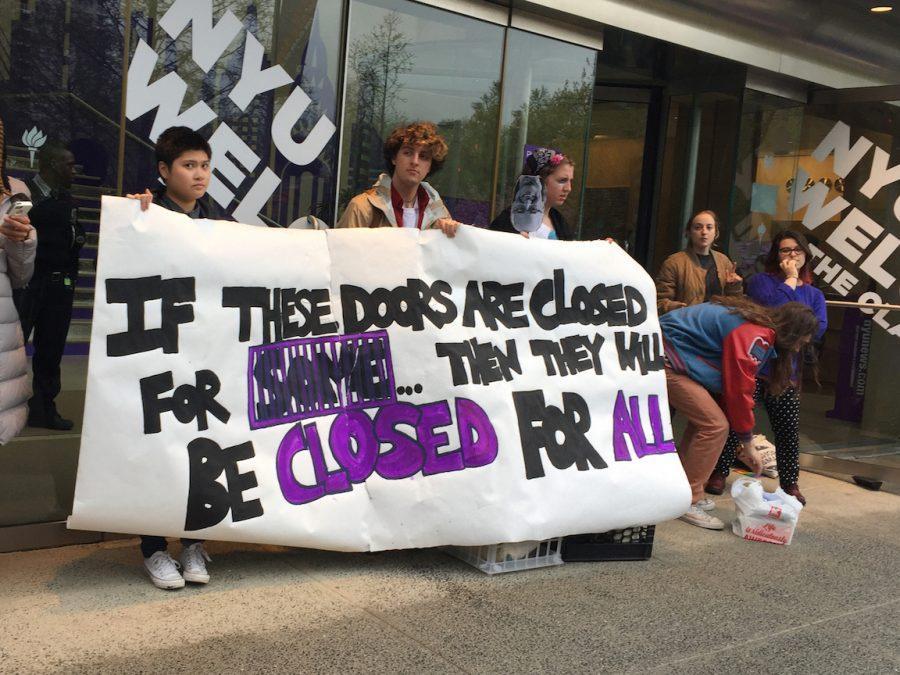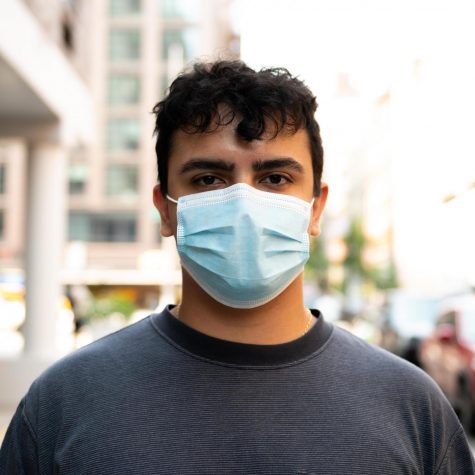An open letter drafted and signed by six Justice Lab students demands that NYU implement reparations for Black students and communities affected by the legacy of chattel slavery in lower Manhattan and the United States more broadly.
“As an entity that is consistently in the top 10 of property owners in New York City, it is NYU’s responsibility to guarantee that it honors, respects, and takes financial responsibility for the way that the experience of African-American students and communities has been shaped and influenced by slavery in New York and the United States as a whole,” the students wrote.
Justice Lab, a two-credit course offered by the Social and Cultural Analysis department, aims to combine research scholarship with political organizing and direct action. Amin Husain, a Gallatin faculty member and instructor of Justice Lab for the Spring 2021 semester, said the course allows students to direct their own learning experience as they analyze systems of power and oppression.
“Students are thinking, and dreaming, and enacting and making worlds,” Husain said. “No one should be excluded from that. My job is to go into a classroom and think about our condition, and think about how we can make it better and care for each other. And I think that when you are part of an institution, you must demand from the institution.”
Addressed to NYU’s Board of Trustees, Deans and Directors, the Senior Leadership Team and the University Senate, the letter lays out nine demands. The demands include creating more scholarships for Black students, cutting ties with the New York City Police Department and reckoning with the university’s role in gentrification. In addition to the open letter, a petition was circulated on social media. At press time, the petition garnered more than 260 signatures.
Gallatin senior Kayla Merriweather, president of NYU’s Black Student Union and a Martin Luther King, Jr. Scholar, spearheaded the effort.
“The landscape that we navigate today was shaped by the enslavement of African people,” Merriweather said. “It’s important for organizations or people or groups who have done harm in the past to take accountability for that in the present.”
In general, the term reparations refers to any effort to remedy an injustice or atrocity, particularly with and through monetary compensation. The U.S. government has implemented reparations programs before — namely for West German victims of the Nazi regime and Japanese American victims of U.S. internment during World War II.
Reparations for transatlantic chattel slavery, however, have a different history. Although demands for restitution date back to the late 18th century, the U.S. government has never made a plan to provide compensation to American descendants of chatel slavery.
“Black Americans are the only group that has not received reparations for state-sanctioned racial discrimination, while slavery afforded some white families the ability to accrue tremendous wealth,” the Brookings Institution wrote in a 2020 policy report.
The Justice Lab students said the idea of organizing a project around reparations came to them through the headlines — particularly through coverage of H.R.40, a U.S. House bill that would establish a commission to study proposals for reparations for American descendants of slavery. President Joe Biden expressed support in February for studying reparations proposals.
The students’ letter also references Evanston, Illinois, which — after a March 22 city council vote — became the first municipal government in the United States to pay reparations to Black residents.
“Although activists have been calling for reparations for decades, steps to formally achieve redress for African-Americans and American Descendants of Slavery are finally crystallizing,” the students’ letter states. “NYU has the opportunity to set a standard for ‘elite’ universities and institutions in the way it treats its African-American students, faculty, and staff.”
If NYU implements the students’ demands, it would join Brown University, Georgetown University and several theological seminaries on the list of higher education institutions pledging funding towards reparations for slavery. Brown and Georgetown came to their decisions via undergraduate-wide referendums.
Steinhardt sophomore Shamon Lawrence, the Senator at-Large for Black Students & Students Experiencing Food Insecurity, is a voting member of the University Senate. He said the reparations measures are necessary and that he will push the University Senate to respond to the effort.
“I definitely do think it’s an important start, to not only create work within the university community, but to make sure that that work continues even far after we’re not at this university anymore,” Lawrence said. “I think that’s the goal of these students who wrote this letter. It shows that they’re not only interested in their inclusion and their belonging at the university — they’re interested in the future. They’re interested in when their descendants, when people that they may know, may come to this university.”
Lawrence pointed to the university’s Academic Achievement Program, the new partnership between Howard University’s and NYU’s nursing schools, and the new James Weldon Johnson Scholars Program as examples of the academic reparations Justice Lab students are demanding more of.
University President Andrew Hamilton and board of trustees chair William Berkley announced the Johnson Scholars Program in a June 2020 statement outlining a number of other efforts, including doubling the Martin Luther King, JR. Scholars Program and expanding funding for the Cross-Cutting Initiative on Inequality.
In the weeks prior to Hamilton and Berkley’s announcement, George Floyd’s death in Minneapolis sparked thousands of demonstrations in what The New York Times described as the largest movement in U.S. history. Police brutality and violence has disproportionately killed Black Americans for years. When people protested police violence last summer, they were tear gassed, beaten, shot with rubber bullets and ran over by police SUVs.
Amid the uprising against police violence, community organizers across the country pressured public school boards and universities to cut ties with local police departments. Two days after Floyd’s killing, the University of Minnesota announced it would no longer use officers from the Minneapolis Police Department at major events. The university made the decision as it faced increasing pressure from student activists.
In January 2021, New York state Attorney General Letitia James filed a lawsuit against the NYPD for arbitrary arrests and excessive force during protests, saying, “The NYPD has repeatedly and blatantly violated the rights of New Yorkers, inflicting significant physical and psychological harm.”
NYPD manuals published by The Intercept shed light on the workings of the Strategic Response Group, a heavily militarized unit of several hundred officers deployed during protests. The manuals include instructions on kettling, mass arrests and the use of Colt M4 assault rifles.
Hamilton and Berkley’s statement mentions Floyd and police violence in passing, but leaves student demands — including most of those later outlined by the Justice Lab students — largely unmet. Provost Katherine Fleming did not respond to request for comment for this story.
Hamilton and Berkley’s announcement notably made no mention of NYU’s relationship with the NYPD. At the end of May 2020, the Graduate Student Organizing Committee and the Incarceration to Education Coalition issued a joint statement calling for NYU to ban police agencies and the U.S. Immigration and Customs Enforcement from campus. In addition to the GSOC and IEC statement, a petition for NYU to cut ties with the NYPD garnered more than 28,200 signatures.
In response, NYU deleted web pages detailing a “strong relationship” between the university and the NYPD.
The opaque relationship between NYU and the NYPD is the focus of the Justice Lab group’s fifth demand that the university cut ties with the NYPD.
The university released a description of the relationship in a June 2020 news release. Attributed to Fountain Walker, vice president of Global Campus Safety, the statement reaffirmed police presence at large university events — including commencement and move-in day — and said that NYPD presence on campus is unavoidable because NYU’s Public Safety Department has no sworn officers and no jurisdiction over public thoroughfares.
CAS junior Connie Wu, who worked on the Justice Lab project and signed the open letter, said the university’s official explanation of the relationship left students unsatisfied.
“Because of the discomfort experienced by students of color and student activists, I really think NYU should take more of a definitive stance against the NYPD,” Wu said. “[NYU] could set an example that, ‘We’re no longer supporting the NYPD, as a powerful institution’ … I feel like it would do a lot to make NYU students feel more safe.”
The students’ final demand is that NYU establish “funds and efforts for NYU faculty & researchers to build a website detailing NYU’s history with slavery.”
Unlike 78 institutions of higher education, including Columbia University, NYU has no coordinated effort dedicated to documenting the university’s ties to chattel slavery, including the history of enslaved people on campus grounds.
From the Dutch colonial period to the 20th century, Greenwich Village was known for its large Black population — part of it was known as “Little Africa.” A 2005 archaeological assessment by the New York City Department of Parks and Recreation confirmed there could be as many as 20,000 sets of human remains buried beneath Washington Square Park, a site that used to serve as a “potter’s field” — a burial site for poor, unclaimed and unidentified people.
“The US is a country that was built by slavery,” Gallatin second-year Camila Sofía Rodríguez-Lopez said. “And that’s a past that shouldn’t be erased, but should really be considered. Because we definitely owe a debt to the descendants of people who suffered in order to create a lot of the institutions that are still here.”
Alexandria Johnson contributed reporting.
Email Suhail Gharaibeh at [email protected].
Correction: Brown University has not pledged funds toward reparations for slavery. Brown’s Task Force on Anti-Black Racism is currently working on recommendations on how to address the legacy of slavery. WSN apologizes for this error.
























































































































































